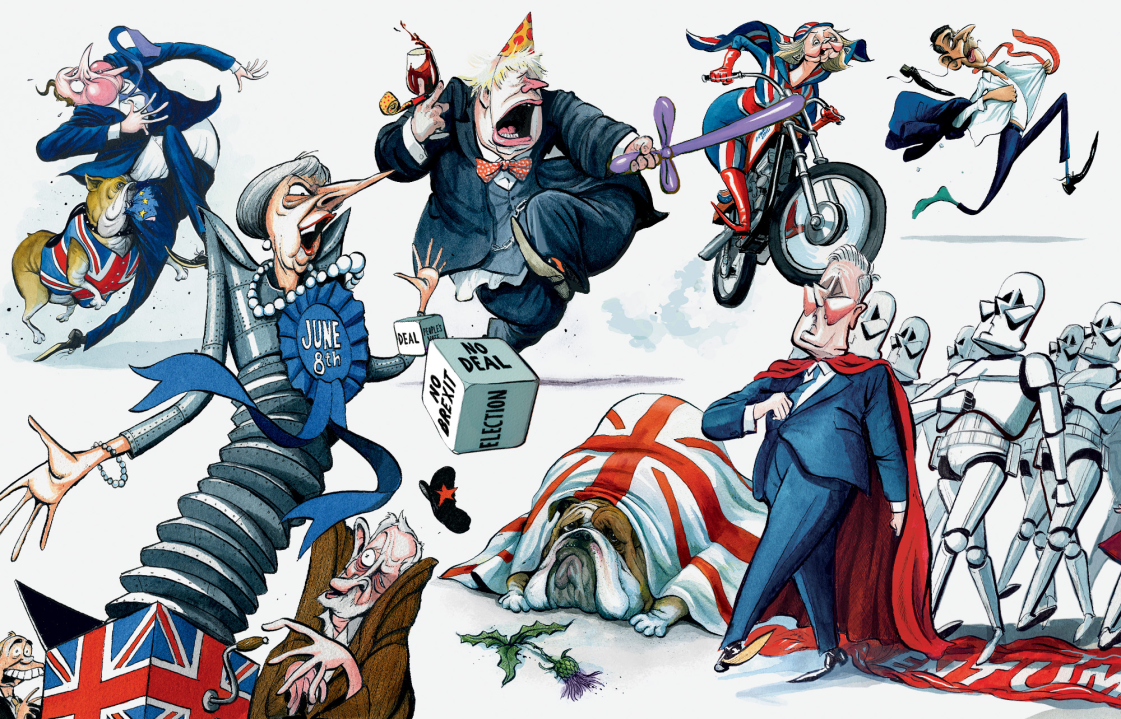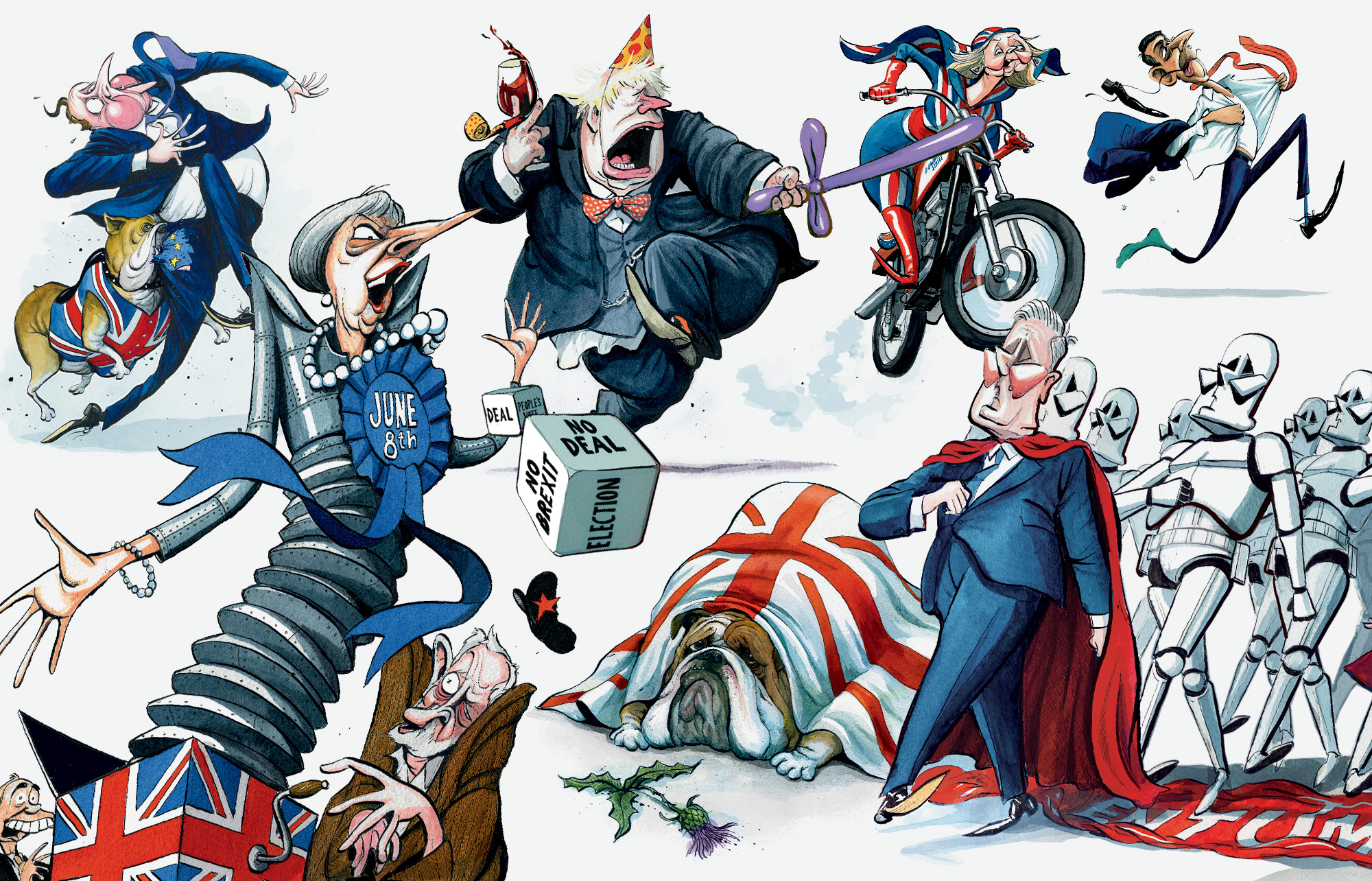On the day Theresa May signed her Brexit withdrawal agreement with Brussels, Dominic Raab, the Brexit secretary, resigned. She tried to dragoon Michael Gove, a leader of the Brexit campaign, into taking the job. Dominic Cummings, the erstwhile campaign director of Vote Leave, persuaded Gove to resign rather than take the job. It was mayhem. That day Cummings texted a friend in Westminster to say: ‘Sometimes nothing happens for years. Sometimes years happen in days.’
The phrase was originally Lenin’s, though he referred to ‘decades’ rather than years – but it was apt for the almost revolutionary cascade of events unleashed by the EU referendum of 2016, which we are still living with eight years later. When Sajid Javid announced he was standing down as an MP after serving as a minister for a decade, he said he felt he had lived through a lifetime of political tumult in ten years.
Once, it was Blair vs Brown every week. The speed at which things have moved since then is dizzying
I know how he feels. I set out to write a book, All Out War, about what struck me as an unusually dramatic period in British political history; then it turned into a trilogy. Now the last part has split into two books, the first of which, No Way Out, has just been published. The second has the subtitle A Year of Political Mayhem. Looking back, it has been more like a decade.
I started as a political reporter during the 2001 general election and the first seven years of my career consisted entirely of Blair vs Brown every week. Ten years ago I started at the Sunday Times. The speed at which things have moved since then is extraordinary. Within four months we had printed an explosive YouGov poll which suggested that Scotland was poised to vote for independence: a previously unthinkable proposition that came close to becoming reality. The chaos had begun, and I don’t think things have calmed down since.
It became a good rule of thumb to expect the unexpected. Just days before the 2015 election, the FT published a Populus ‘predictor’ polling model which gave David Cameron a 0.5 per cent chance of winning a majority. His surprise victory meant that he had to deliver on the manifesto pledge of a referendum on leaving the European Union. Oliver Letwin confirms in my new book what we all suspected: that Cameron had intended to ditch the pledge in what he thought would be new coalition talks with the Lib Dems. Instead we got Brexit.
Uncertainty reigned. Many of the Labour MPs who nominated Jeremy Corbyn as leader only did so because they thought he had zero chance of winning. His 2015 win led serious Labour figures, including Tony Blair, to write Labour off as unelectable. So in 2017, the Tories had a 20 point lead and Theresa May thought she could risk a snap election: at the time, it looked like she could be PM for a decade or more. In a shock turn-around, Labour did far better than expected and the Tories lost their majority.
Two years on, Nigel Farage created the Brexit party from scratch (a wildly successful startup) and forced the Tories into a derisory fifth place in the 2019 European elections with a 9 per cent share. Now it was the Conservatives’ turn to look doomed.
Politics is simple but it is hard. To succeed, leaders must let themselves be steered by both conviction and polling; they need to plot a tactical path forward, and the communication skills to take voters with them. The only time in the past seven years when all these elements have been in play was in the latter half of 2019, when Boris Johnson and Dominic Cummings used a combination of brute force and cleverness to get Brexit done. They forged a new voter base. Johnson won an 80-seat majority and the populists were nowhere to be seen. The future, it seemed then, was Conservative. But it was a coalition of voters that it seemed perhaps only Johnson could sustain.
Today, Keir Starmer – who had been on the verge of resigning in 2021 when Labour lost the Hartlepool by-election – looks like he’ll be weighing rather than counting his votes when the public gets a chance to decide at the general election. The opinion poll lead he enjoys is consistent with an almost unprecedented majority of 270 MPs.
What has caused this political chaos? One reason has been the breakdown of the traditional bonds of political loyalty which tied voters in certain places to the parties of their grandparents. That loyalty, once lost, is not transferred to a new party. Red-wallers who abandoned Labour in 2019 to lend Johnson their votes are now moving on again: many of them to a new party, Richard Tice’s Reform. Meanwhile, Scotland has gone from being regarded as a Labour fiefdom to an SNP fortress to a country where votes are once again up for grabs.
At the same time we have seen a breakdown of deference and whipping in parliament, where younger MPs have little time for the blackmail and brutality of 1970s party management. William Hague famously said that the Tory party was ‘an absolute monarchy, moderated by regicide’. Having tasted blood, Conservatives keep wanting more.
A revival in the politics of place, or national identity, is also a factor. It almost ended the Union in the Scottish referendum and it drove support for Brexit, particularly in England. But it never mapped on to party politics.
One reason for the unpredictability has been the breakdown of the traditional bonds of political loyalty
The result of the Brexit referendum was grafted on to the Westminster system of representative democracy: 70 per cent of MPs backed Remain but they were expected to deliver a Leave vote which commanded just 52 per cent of public support. It was a recipe for disaster, gridlock and extremism. This was exacerbated by the Fixed Term Parliament Act, which made it impossible for the May government to force people into choosing a compromise by threatening to call a general election.
Westminster’s first-past-the-post system is designed to turn close elections into more decisive outcomes – avoiding the coalitions seen in the continent (no bad thing in my view). This does mean violent swings of fortune. But it is also why, alone among major European countries, the UK has not had a breakthrough populist party in parliament. It’s quite possible that Reform will win five million votes but not a single seat.
Is there any pattern detectable here? For someone who has spent so long in the weeds of our politics and is fascinated by the interplay of personalities, I’d say the character and abilities of successive prime ministers have been decisive. If you could take Boris Johnson’s feral political skills, his boundless optimism and public charisma; Rishi Sunak’s meticulous attention to detail; Theresa May’s dedication to public service and Liz Truss’s bloody-minded determination, and mix these qualities altogether, you could construct a very good prime minister. But individually each was lacking.
Keir Starmer has only had to be sensible and a bit ruthless to position himself for victory. If Labour does win, the size of that victory will be vital for Starmer and for the country. A landslide would ensure that he could do as he wished, but that might expose the limits of his vision and the difficulty of tackling the problems that have lingered ever since the 2008 financial crash. It would also ensure that the Labour government’s main opposition would come from within the party. So: back to Blair vs Brown.
And after that? Whenever parties have revived themselves (as under Thatcher, Blair, Cameron and Johnson), the common factor has been dynamic new leadership that combines a sense of where we have come from with a clear vision for the future. The past few years have made the public wearier of politics and politicians, and more cynical about modern communications – but still willing to be galvanised. If this does not happen, we risk remaining in a hyperloop leading somewhere much worse.









Comments